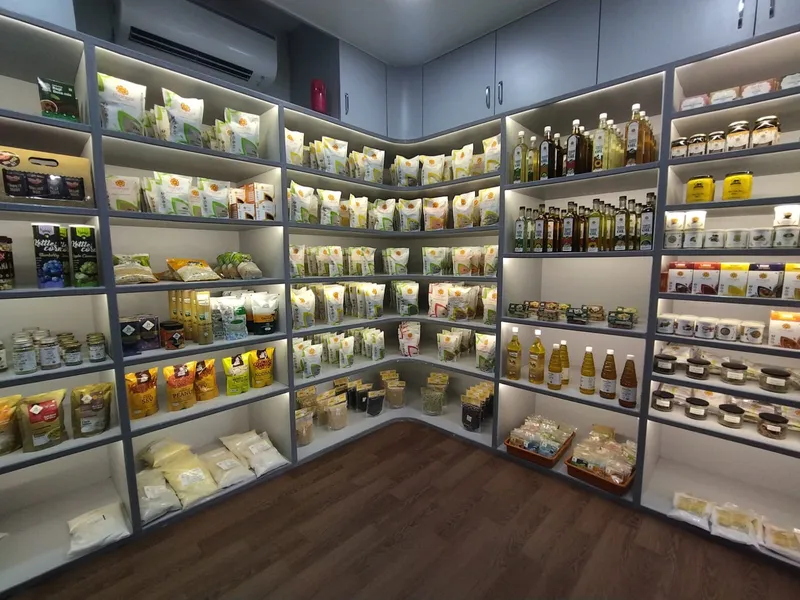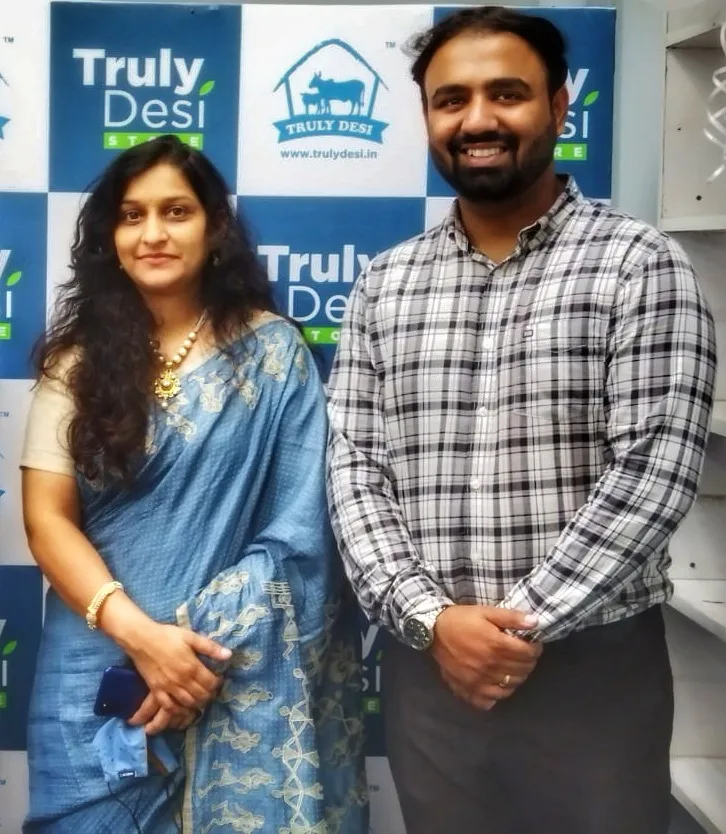This mother’s quest for unadulterated milk led to her launching a profitable dairy startup
Pune-based Rupali Kakade launched Truly Desi in 2018 with Mohit Rathod. Its products are now found in premium stores like Nature’s Basket, Dorabjee’s and more across Pune, besides their own retail store at Balewadi.
In 2015, Pune-based Rupali Kakade’s four-year-old daughter would often fall severely ill with a stomach infection. After repeated visits to the paediatrician, the doctor suggested removing milk from her diet to see whether it made a difference. To Rupali’s surprise, the child had stopped falling sick, but the fraught mother was worried about the kind of milk her daughter was consuming.
“The constant worry led me to start researching different types of milk available in the market and their source. Once my daughter was well and the doctor gave us the go-ahead to start consuming milk again, I just could not trust any brand available in the market,” Rupali tells HerStory.
Milk adulteration in India is more rampant than one would like to believe. Nearly 79% of branded or loose milk available in the market is adulterated, according to an alarming report by the Consumer Guidance Society of India (CGSI). Raids by food safety authorities have shown that milk is most often adulterated with urea, starch, detergent, caustic soda, formalin, glucose, and water. Although both the Supreme Court and the central government have called for stringent punishment of culprits, adulteration of milk continues to be the norm rather than an exception.
Untrustworthy about the quality of milk available in the market, Rupali decided to find a solution herself. With a little help from her in-laws’ agrarian background and her own father, who was a dairy farmer, Rupali came up with a solution.
“My in-laws are into farming and they have a lot of farmland in Junnar, about 100 km from Pune. There, we bought 13 cows at our farm and started researching not only milk, but also other by-products of milk,” she adds.
Before they knew it, the cows on their farm were producing enough milk to distribute to friends and family. “We realised that there was a huge demand for pure milk, and knew this could be turned into a viable business model,” Rupali remarks. In 2018, she founded Gauecogram Agrovikas Producer Co Ltd, which was later rebranded to .

Truly Desi store at Balewadi, Pune
Starting up
Rupali initially roped in Mohit Rathod, a startup consultant, to help with strategy and other aspects of the new enterprise. However, Mohit was so convinced about Truly Desi’s potential, that he joined the venture as a co-founder in 2018.
The two co-founders pitched in a total of Rs 25 lakh from their personal savings to get the business up and running, and the firm continues to be bootstrapped.
Truly Desi started by delivering fresh milk in packets in January 2019. “Initially, we produced only about 30-40 litres of milk a day, but by the end of the year, it was around 250-300 litres,” says Rupali, whose farm is now home to nearly 100 cows. The startup relies on additional 300-350 cows from a network of connected farms.
Truly Desi’s production unit is in Balewadi, near Pune, and Rupali has outsourced milk pasteurisation to another nearby unit. “At Balewadi, we package our milk and process other by-products like paneer and Bilona ghee, which is made using a traditional method,” the Founder and MD of Truly Desi adds. The company has 12 employees in the production unit, and about 10 at the farm.
Rupali says that the brand is now famous for its kulhad dahi, curd in a mud pot. Along with that, Truly Desi sells its milk and paneer across Pune through premium outlets like Dorabjee’s, Nature’s Basket, Fine Foods, etc. Its Bilona ghee is also available on ecommerce sites like Amazon, Flipkart etc. Truly Desi has one company-owned retail store in Balewadi, Pune.
What started as a simple dairy farm, Truly Desi is now working to achieve sustainability and zero waste targets. Rupali says the startup has tied up with over 15,000 certified organic farmers all over Maharashtra to source groceries including grains, vegetables, and fruits.
“We provide organic farmers with cow dung and cow urine for organic fertiliser, besides encouraging them to stick to their organic farming practices even when it does not look easy,” says Rupali. The firm buys back the vegetables from the farms where they provide organic fertiliser. At the farm, the team has also got a biogas unit installed for cooking and water heating purposes. The slurry from the unit is reused as organic fertiliser.
For Rupali, traceability is a big factor. “We enable our customers to see the entire process at our manufacturing outlet; transparency is very important to us,” she notes, alluding to her earlier experience of buying milk from the market without knowing its exact source. Currently, the company is working on upgrading the technology to include a scanning code on each product, including its fruits and vegetables, so that customers can trace it back to its origin.

Truly Desi co-founders - Rupali Kakade and Mohit Rathod
Revenue and next steps
In the first year, Rupali says the startup earned Rs 5.89 lakh in revenues. Its revenue in FY 2022 was Rs 2.85 crore, which the founder attributes to the huge growth the company saw during the pandemic when people were more mindful about consuming healthy food. The brand aims to close at Rs 5 crore this financial year.
According to a Research and Markets report, the Indian dairy market attained a value of $144.55 billion in 2020. The report stated that the growth was aided by the extensive use of dairy products in Indian cuisines, and so the market is projected to further grow at a CAGR of 6% between 2021 and 2026.
Truly Desi is in the process of introducing more products. “We are coming up with A2 ice cream, with the option of low-calorie sugar-free A2 ice cream as well. Sugar-free shrikhand in different flavours is also in the offing. A bunch of superfoods are also being researched.
“We are also focusing on millets, and are working with about 250 tribal women from Akole in Maharashtra as they produce all types of millets in the region. They are growing about 10-15 varieties of rice,” says Rupali.
In the next six months, Rupali and Mohit aim to strengthen the company’s backend processes by further integrating with technology. “We want to give production franchises to farmers at different locations. The way I see it, as we grow, we cannot just supply products from a single location like Pune, that will beat the purpose of keeping our products fresh,” says Rupali.
Edited by Kanishk Singh









